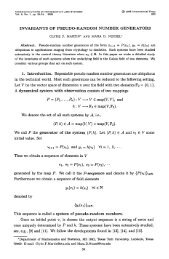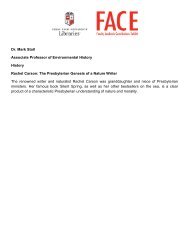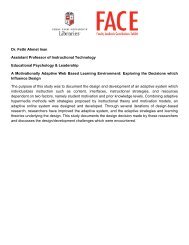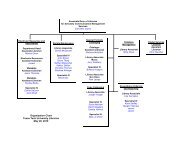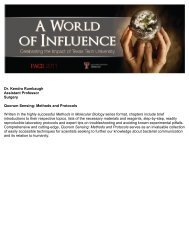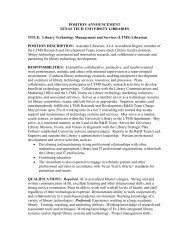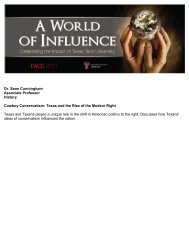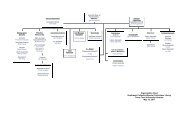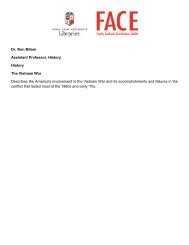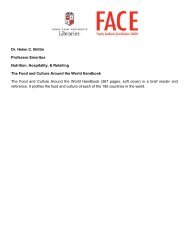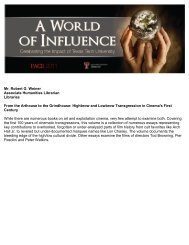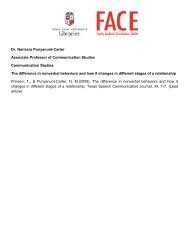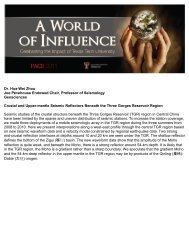Nonprofit Organizations Law and Policy Third Edition - Libraries ...
Nonprofit Organizations Law and Policy Third Edition - Libraries ...
Nonprofit Organizations Law and Policy Third Edition - Libraries ...
You also want an ePaper? Increase the reach of your titles
YUMPU automatically turns print PDFs into web optimized ePapers that Google loves.
14 OVERVIEW OF THE NONPROFIT SECTOR CH. 1<br />
action. Should such an eventuality develop, the employee or employees<br />
involved would not be protected by section 703(a)(1) of the Act from<br />
failures or refusals to hire, discharge, or take other action to protect the<br />
efficient conduct of the employer's business.<br />
<strong>Third</strong>. The government raises a fundamental question of principle. It<br />
argues that what is at stake here is the integrity of the Internal Revenue<br />
Service <strong>and</strong>, indeed, of the Nation's uniform tax system itself. Citizens are<br />
entitled to have confidence in that Service <strong>and</strong> that system, <strong>and</strong> this<br />
confidence, so it is claimed, would be jeopardized if plaintiffs insistence on<br />
his interpretation of law <strong>and</strong> public policy were allowed to prevail. The<br />
Service also argues in this connection that different st<strong>and</strong>ards must be<br />
applied to judicial or quasi-judicial officers than to employees who carry<br />
out mere ministerial functions, <strong>and</strong> that any deviation by such an officer<br />
from duly promulgated law <strong>and</strong> policy must be regarded as per se<br />
inflicting an undue hardship on the government which employs him.<br />
Those arguments would be extremely persuasive, even conclusive, if<br />
plaintiff were taking the position that he would deny tax exemptions to<br />
organizations to whose policies he objects. Indeed it may be that, at one<br />
time in the course of the administrative proceedings, he took that very<br />
position. But that is not the posture of this case now. Plaintiff does not<br />
assert that he will tailor his decisions to his beliefs but merely that, when<br />
there is a conflict between his beliefs <strong>and</strong> what the law would require him<br />
to decide, he will in effect disqualify himself <strong>and</strong> request that the matter<br />
be reassigned to another reviewer. It is difficult to see how that st<strong>and</strong><br />
could impair taxpayer confidence in the tax system or the impartiality of<br />
the IRS. * * *<br />
The government also suggests that it should not have to accommodate<br />
itself to the kind of internal dissent from its policies exemplified by<br />
plaintiffs refusal to process applications for tax exemption from abortion<br />
clinics. The short answer is that provided in the Civil Rights Act itself<br />
which directs that, absent undue hardship to its operations, the Internal<br />
Revenue Service, like any other covered employer, must accommodate<br />
itself to dissent based on religious belief.<br />
* * *<br />
NOTE<br />
If an organization receives an adverse determination from the IRS as to<br />
the exempt status of the organization, or the failure to qualify as a § 501(c)(3)<br />
organization, it will be advised of its right to protest the determination by<br />
requesting the Appeals Office of the Service to consider the case. A protest<br />
must be submitted to the Internal Revenue Service within thirty days from<br />
the date of the adverse determination. 6 The Appeals Office must request<br />
technical advice from the IRS national Office in Washington, D.C. concerning<br />
qualifications for exemption if there is no published precedent or if there is<br />
6. Treas. Reg. § 601.201(n)(5)(i), (6)(ii)(b). See Rev. Proc. 90-27, 1990-1 C.B. 514, 517.



